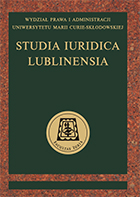Prawo do sądu w sprawach dyscyplinarnych radców prawnych
Right to the Court in Legal Advisors Disciplinary Case
Author(s): Sławomir PilipiecSubject(s): Constitutional Law, Governance
Published by: Wydawnictwo Naukowe Uniwersytetu Marii Curie-Sklodowskiej
Keywords: legal advisor; disciplinary case; self-governments of legal advisors; the right to access the court; the right to fair proceedings; the right to court judgement; the right to defence;
Summary/Abstract: Self-governments of legal advisors represent legal advisors practice profession in which the public repose confidence, and such self-governments shall concern themselves with the proper practice of such professions in accordance with, and for the purpose of protecting, the public interest. Legal advisors self-governments shall concern themselves with the proper practice of such professions is formal in the disciplinary case. Disciplinary case is repressive and extrajudicial. Legal advisors right to the court is also a similar right to the state court but is guided by the disciplinary prosecutor and disciplinary court The right to the court, as a personal right of each individual, is defined in Article 45, § 1 of the Constitution which states “Everyone shall have the right to a fair and public hearing of his case, without undue delay, before a competent, impartial and independent court”. Thus, the right to the court consists of a few inseparable elements: 1) the right to access the court, that is the right to initiate court proceedings in the case of infringing the protected rights of an individual; the access has to be genuine due to, among others, the right territorial organization of courts and reasonable fees, 2) the right to fair proceedings, that is the proper shaping of the court proceedings (based on the proper procedure, honest and public trial, participation of the suing individual in the proceedings which guarantee their rights), 3) the right to court judgement (receiving a court decision solving the issue within reasonable time), 4) the right to defence, 5) the right to be heard (the right to information, taking positions, considering actual statements and legal demands). It seems that the right to court judgement, the right to defence and to be heard are all included in the widely interpreted right to fair proceedings. A complementary item to the right to sue is Article 77, § 2 of the Constitution of the Republic of Poland according to which “Statutes shall not bar the recourse by any person to the courts in pursuit of claims alleging infringement of freedoms or rights”.
Journal: Studia Iuridica Lublinensia
- Issue Year: 25/2016
- Issue No: 3
- Page Range: 749-765
- Page Count: 17
- Language: Polish

